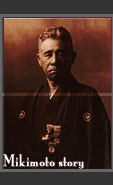| |
The
humble oyster teaches transcendence over suffering and adversity.
If you
have ever watched a video on pearl farming, you would have seen how a
pearl is cultivated. Essentially, a technician makes an incision in an
oyster and grafts a shell bead together with some tissue cells inside
to start the pearl formation process. Some people feel for the oysters
and find the operation an affliction imposed on the creatures.
I can understand this
empathy. On the other hand, the humble mollusc offers us an enlightening
lesson on beauty, humility and tolerance.
"One of the lowest of earth's
creatures, suffering a misfortune, furnishes a wonderful lesson upon the
uses of adversity by converting its affliction into a precious gem symbolical
of all that is pure and beautiful. " These are the words of the authors
of The Book of The Pearl, Kunz and Stevenson, and they have deepened my
passion for pearls as the years go by.
Aren't we all a
bit of an oyster in our daily life? We come face to face with challenges
and problems over which we have little control. We dwell in our comfortable
shell, and try our best to stay safe, shutting ourselves out from the
turbulent world outside. When faced with a challenge, our natural instinct
is to ignore, resist, complain or fight against it.
|
|
| |
The
oyster, on the other hand, turns its affliction into
a beautiful pearl. The operated pearl oyster detects the presence
of a
foreign substance in its abdomen. Its first instinct is to
expel it. If the
oyster is robust, it may succeed in expelling the grafted
shell bead. if not,
it has to opt for a more complex alternative - it neutralises
the foeign
substance by secreting nacreous coatings around it, turning
the foreign
body into something it can live in harmony with.
Herein
lies the lesson we can learn from the oyster-that of tolerance
We humans share an innate fear of differences.
Our instinct of self-preservation drives us to view differences
as threats,
and to eliminate differences before making an attempt to comprehend
its nature. The Earth houses different peoples, races and
cultures, and
we use different languages and manners to express our perceptions
of life.
|
|
|
When
differences meet, instead of trying to fight against them, we should
learn from the oyster: accept and live with all these differences.
In doing so we can avoid violence and clashes and achieve harmony
and beauty. What appears at first as a misfortune can turn out to
be an elevation towards something magnificent, as in the case of
the oyster and its precious pearl.
In a
world of escalating violence, the pearl is indeed an ideal metaphor
for tolerance, a symbol of transcendence over differences and sufferings.
If you
are in the middle of a testing moment of your life, envision a glowing
pearl, and tell yourself that things will come out fine, that your
tumultuous experience will crystallise into something as soothing,
pure and sublime as a pearl. If a humble primitive oyster can do
it, we can do it too. S
To read more about pearls under this series, log on to www.solitaire.com.sg/pearltalk
|
|
|
|





















